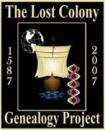This summer, I have taken a break from the books to explore Hatteras Island history with Roberta Estes, Dawn Taylor, Anne Poole, Scott Dawson, and many other fine professionals and experienced volunteers to find out what happened to John White's Roanoke colonists. Yeah, I know... not again! Well, yes... this time, it's a serious and painstaking approach to find those who might have blended with the original Croatoan Indians and then spread out into Eastern NC, becoming "lost" in plain sight, as they say.
As Scott will tell you in his book, Croatoan: Birthplace of America, the colonists of 1587 were not "lost" but rather abandoned on Croatoan (Hatteras). John White knew that they had gone to Croatoan by the message they left for him on Roanoke and tried to get there but was held off by a storm. His captain told him that they couldn't stay and so they went back to England. White had waited for three years, held in check by the attack of the Spanish Armada that concentrated all of England's naval forces upon the attack. When he finally gets the chance to rescue his daughter, her husband and newborn daughter, Virginia Dare, plus the other hundred or so colonists, he is forced to leave and never to return. If Queen Elizabeth had lived, she may have sent another mission. Unfortunately, she died and James I became king. It was James I who had other directions to go... namely founding Jamestown in 1607. As a consequence, he simply abandoned the search altogether. The colonists presumably lived with the friendly Croatoan on Hatteras, possibly marrying into the tribe, to be rediscovered by John Lawson in 1701. "Grey-eyed" Indians that could "talk in a book" impressed him not too little and he made note of this in his book, A New Voyage to Carolina, text available at UNC's Documenting the American South website. [Scott Dawson is a local historian and researcher who maintains Hatteras Histories Mysteries museum in Buxton.]
Anyway, Europeans came into NC mostly through Virginia in the later half of the 17th century and probably refound the Croatoan still on the island (they had incurred the enmity of the mainland tribes for hanging out with the Europeans who had tried to kill them more than once). Still, White's colony was not Richard Grenville and his gang, the butthead that he was and the Croatoan got along just fine with them.
As for blending with the Indians, a process known as "miscegenation," a possible letter to the Society for the Propagation of the Gospel in Foreign Parts (whew!) tells of people from Hatteras and Ocracoke who came to get baptized. The letter states that, "these persons, half indian and half English, are an offense to my own and I gravely doubt the Kingdom of Heaven was designed to accomodate such. They stunk and their condition was not improved by the amounts of sacramental wine they lapped up nor by sprinkling with baptismal waters." This letter was found in the Hatterasman, by Ben Dixon MacNeill.
If these guys are the descendants of half-English and half-Croatoans, they may also be the descendants of White's colonists! That's the supposition and that's what the Lost Colony Research Group (the group I joined) is trying to prove. DNA is going to be the answer to this question and it involves DNA comparisons across the Atlantic Ocean with samples obtained from living relatives of colonists who left Bideford, England. The former mayor of Bideford, Andy Powell, is gun-ho with this idea and would lead it himself if we didn't tag along. lol The rest of us, many of us students and researchers like myself are tasked with providing the historical research to link these early colonists with living descendants today for DNA comparison purposes. (Note that the Lost Colony Center for Science and Research has had some questionable practices lately and I do not recommend working through them.)
My task as of late has been to do Hyde County research on the surnames involved and also to piece back together a map of Hatteras in 1770. The Indian Town mentioned on many deeds from 1716 to 1801 is the target of our groups' archaeological study and we would like to know where it is. That would be a good idea before you start digging. Aside from this town, two digs have already been done, turning up thousands of artifacts, some of which are displayed in Scott's local museum. Compare this with Roanoke Island's 102 digs and the resulting lack of artifacts. Hatteras is a wealth of native knowledge yet to be explored. We could be very close to a discovery of immense importance. Time will tell. Personally, I'd like to think that North Carolina has the first English colony in North America. That would just be cool. But, to possibly be descended from those particular colonists is beyond exciting for many North Carolinians!


1 comment:
A lot of the descendants of Hattarask migrated to the mainland and then back from the mainland during and after the Tuscarora war.
Post a Comment